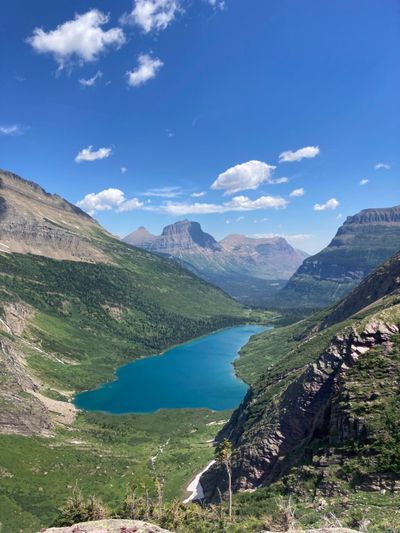Plan for bull trout in Gunsight Lake violates federal law, groups allege

Just because climate change could affect bull trout doesn’t mean federal agencies can move them to Gunsight Lake from other St. Mary watershed lakes without complying with the law.
That’s according to a notice sent to Glacier National Park, the National Park Service and the U.S. Fish and Wildlife Service by two conservation groups alleging violations of the federal Endangered Species Act.
“No one doubts that climate change is already causing drastic impacts on species across the globe,” said the notice. “Climate change could affect bull trout because ‘warmer water temperatures stress native trout, degrade habitat, and favor non-native species.’
“But that imperative does not give agencies license to ignore the (Endangered Species Act).”
The Friends of the Wild Swan and Council on Wildlife and Fish filed the notice alleging the plan illegally threatens bull trout. They said if the federal agencies don’t change course, they will file a lawsuit in federal court.
The law requires such groups to put federal agencies on alert that they plan to sue and offer them one last chance to correct problems. The notice is final warning in advance of litigation.
“This project is an experiment,” said Arlene Montgomery, program director for Friends of the Wild Swan, in a statement. “The Park did not have a proper permit to relocate threatened bull trout wherever it wanted.
“Yet the Fish and Wildlife Service went along with the scheme.”
In August , Glacier National Park announced it had approved a project for Gunsight Lake, roughly 6 miles from the Jackson Glacier Overlook trailhead on the east side of the park.
As planned, the project would remove non-native rainbow trout from the lake in 2023 and would later stock native fish, bull trout, mountain whitefish and westslope cutthroat trout.
According to Glacier National Park, an environmental assessment found no significant adverse impacts for the plan.
Glacier Park could not be immediately reached Monday afternoon about the status of stocking bull trout in Gunsight Lake or for comment on the alleged violations.
A Glacier scientist, however, earlier said the project was an attempt to preserve the native species as the climate warms by putting them in a cold lake, a potentially ideal location.
The Fish and Wildlife Service also could not be immediately reached by voicemail.
But Gunsight Lake was historically fishless, bull trout are threatened, and the Park Service plan illegally creates an “experimental population,” the conservation groups allege. For one thing, they said, only the Fish and Wildlife Service can designate an “experimental population.”
“The Park Service is acting outside of its lane,” said Jared Pettinato, a lawyer for the conservation groups.
“Congress assigned responsibility for expanding ranges of endangered and threatened species to the U.S. Fish and Wildlife Service.”
The conservation groups argue that putting bull trout in Gunsight Lake is “experimental” by a couple of different definitions.
First, the plan puts the population “outside its current range,” the groups said.
Second, in Gunsight Lake, the population won’t overlap with any nonexperimental bull trout, they said; some bull trout might swim over the waterfalls and out of Gunsight Lake, but none could return.
“To ensure Fish and Wildlife considers all of the factors when introducing an experimental population, the ESA prohibits creating experimental listed populations by introducing threatened species outside their current range except ‘by regulation,’ ” the groups said in their notice.
“Fish and Wildlife never issued a regulation.”
Therefore, the Park Service’s approval of the plan violates the Endangered Species Act, and the introduction of bull trout to Gunsight Lake constitutes an illegal “taking” of the threatened species, the groups allege.
“The Park Service has done these illegal introductions before, and the ESA requires it to stop,” the notice said.
The groups also allege the Fish and Wildlife Service is breaching its duties to enforce the Endangered Species Act by failing to pursue civil and criminal penalties against the Park Service.
“Moving bull trout, a species under Endangered Species Act protection, to an unproven new location outside its current and historic range is risky, costly, controversial, and unlawful,” said Steve Kelly, president of the Council on Wildlife and Fish, in a statement.
Friends of the Wild Swan Fish is an advocacy group with a mission in part to improve fish and wildlife habitat. Council on Wildlife and Fish is a Bozeman-based nonprofit that works to ensure ecological integrity of natural ecosystems.